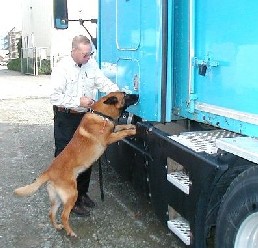The US Supreme Court Monday refused to hear two appeals from states where the courts have moved to impose restrictions on drug-related searches. While the court's decision not to hear the cases signals no change in federal law, it does mean that residents of the states in question will be protected from the practices at issue.

A Florida appeals court threw out Rabb's conviction, arguing that the drug dog sniff of a home amounted to an unconstitutional invasion of privacy. Last year, the state of Florida appealed to the US Supreme Court, and the high court ordered the appeals court to reconsider its decision in the wake of the Supreme Court's 2005 drug dog search ruling in Illinois v. Caballes, where the court approved the constitutionality of drug dog sniffs during traffic stops. But the Florida appeals court instead cited another US Supreme Court case, Kyllo v. US, where the court held that the use of infrared sensors to detect heat emissions from a grow lamp was an impermissible violation of the Fourth Amendment.
By refusing to hear Florida's appeal in the Rabb case, the court signaled it was not prepared to extend its Caballes reasoning to home searches. On the other hand, the high court last year also refused to hear the case of David Gregory Smith, in which the Utah Supreme Court upheld his conviction after a search triggered by a drug dog sniff at his front door.
In the second case, Illinois v. Sloup, John Sloup was arrested for possession of a crack pipe during a traffic stop. Sloup appealed his conviction on the grounds that the police officer did not have reasonable suspicion an offense had been committed before asking Sloup's permission to search his vehicle. An Illinois appeals court agreed with Sloup, and overturned his conviction. By refusing to take the state's appeal, the US Supreme Court let the decision stand.
The two cases are binding only in the states where they were tried, but could provide grist for the mill in other states as well when courts there hear similar cases. In the meantime at least, Florida residents are safe from warrantless drug dog sniffs of their homes (but Utah residents are not) and Illinois residents have slightly more protection from unwarranted searches during traffic stops.
This work by StoptheDrugWar.org is licensed under Creative Commons Attribution-ShareAlike 4.0 International
Comments
Search laws
While some of the court decisions are encouraging insofar as they help protect a citizen's civil rights, they are academic in many arrest events where the participating law enforcement personnel believe that "testilying" is standard police procedure. Too often the prosecutor's office, while not always active participants in the practice, will ignore testimonial inconsistencies.
In reply to Search laws by Anonymous (not verified)
nope
For dogs around cars it was held to not violate a Reasonable Expectation of Privacy, thus not a search. This precludes officers from lying about having suspicion, as they need no suspicion. This is not a situation that brings up that issue.
In reply to Search laws by Anonymous (not verified)
Illinois Vs. Sloup
And if the jury hadn't overturned it - maybe he would've gone to jail, maybe he would've stayed in a rehab that actually clicked...Maybe he'd still be around for his daughter.
Today is the 1 year anniversary of his death.
The Smith case comes from Texas, Not Utah
The Smith case comes from Texas, Not Utah
Add new comment